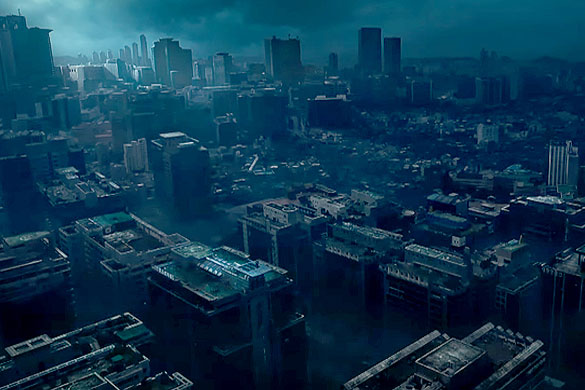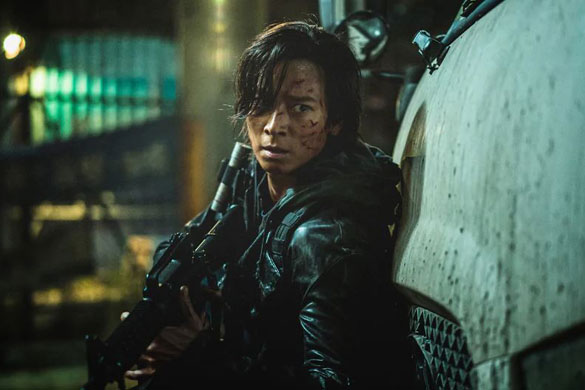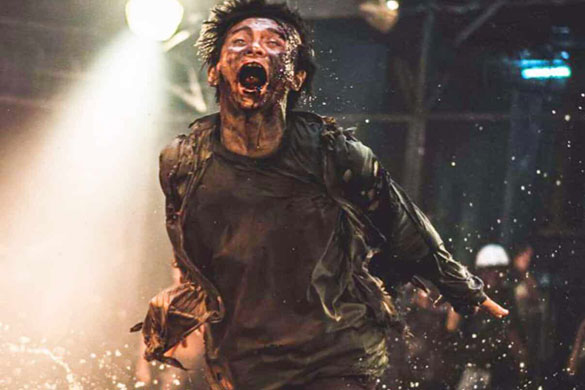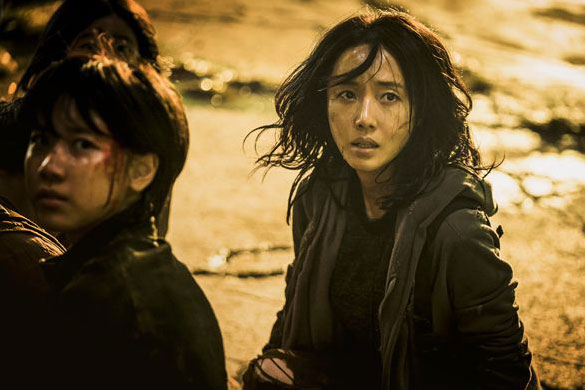
 |
||||
In the four years since a zombie outbreak gripped the Peninsula (quite literally), Korean has been wholly quarantined with no transport to or from the country allowed and movement of anyone in or out expressly forbidden, aside from all too rare sanctioned UN humanitarian rescues. Borders closing and the world largely leaving Korea to its own devices has unsurprisingly allowed the outbreak to explode, leaving the landscape largely an undead filled wasteland with survivors holed up in fortified refugee camps or forming commando style family units in a desperate effort to continue to survive in the face of marauding, feral zombie hoards.
Review: We’re first introduced to Jung-seok as he drives with his wife, son and brother-in-law to port in order to take passage on a ship leaving Korea for safer foreign shores. Within that journey, he is flagged down by a desperately frightened woman begging to be taken along, or at the very least for her young daughter to be driven to safety from the increasing zombie threat. Though he, of course, doesn’t yet know, his absolute refusal to help the woman and child will require atonement at a much later pivotal moment and, if you believe in karma, it could be said he will also have a major price to pay far sooner, within a short time of the ship setting sail supposedly away from danger. From the narrative’s perspective, these early scenes initially appear to be present day, but televised journalist questions posed to an expert on the situation (the expert played by Pierce Conran, founder of the Modern Korean Cinema Korean film review website) soon reveal that Jung-seok’s car and boat journey actually took place four years ago before Korean was entirely quarantined and completely shut off from the outside world, just as from a real life point of view Train to Busan opened in cinemas in 2016 and we’re now watching the sequel released in 2020.As such, coming in the immediate wake of the zombie outbreak, the tone of these early stages rightly feels very similar to that of Train to Busan itself. However, its wholly separate, far more noir tonality emerges as the narrative properly switches and jumps forward to Jung-seok’s story in the present day. Peninsula’s basic premise is Jung-seok’s efforts to find the truck amid a virtual wild west of zombies and his need to keep others who have discovered it’s filled with cash from taking it from him for their own ends with character led themes of humanity – or a dog-eat-dog lack thereof – gradually extending, embellishing and increasing the narrative threads overall. As such, Yeon Sang-ho’s sequel to Train to Busan fits the not uncommon narrative trope of individuals in a cat and mouse game over possession of a hoard of (often found or stolen) money, be it contained in a bag, suitcase, hidden location or, in the case of Peninsula, a truck. Films of this ilk, wherever they’re from, are more often than not used to point to the worst and best of humanity (there’s that word again) and as a palpable depiction of the ‘money is the root of all evil’ notion and the best examples successfully weave an intricate web of selfishness, deception and betrayal. In terms of Korean cinema, start looking back and before you even reach the start of 2020 and you’ll find Beasts Clawing at Straws – a deeply twisted, multi-layered and beautifully unpredictable cat-and-mouse tale of betrayal and mayhem in a genuinely droll toned pursuit of an elusive bag of cash.
Admittedly in the case of Peninsula, the cash truck element is just (and only) a plot device on the most basic level to bring Jung-seok back to Korea and draw other characters into the frame in opposition to him, but the fact that so many films using the ‘chase for cash’ idea have tier upon tier of character arcs and motives expertly created to gradually move inextricably towards volatile collision, in the process showing palpable originality and unpredictability, virtually guaranteed that I would be hoping for at least some of the same from this Train to Busan sequel. However, Peninsula is a much simpler affair than that would require and with so many of the characters being far more caricatures than fully fledged, viewers will likely see what’s coming long before it arrives to the extent that I was pretty accurately even able to predict who of the main characters would live and who would die, well in advance. “Okay”, I hear you cry, “but this is a zombiefest spectacle, plain and simple” and yes, you’re right on a basic commercial level, for viewers looking for two hours of CGI-laden escapism without the need to think too hard, but with the commercial blockbuster aspect having been perfectly covered in Train to Busan and with Yeon Sang-ho’s animated prequel (if you will), Seoul Station, having been so deftly different in tone I’d have l liked to have seen Peninsula taking things yet further into new territory adding a depth that would have allowed it to transcend its basic genre bounds. After all, genre merging to create highly original narratives that defy pigeon-holing entirely was a big part of what drew so many of us to Korean cinema in the first place and Peninsula so easily could and should have been exactly that rather than simply more of the same, in essence.
That said, the, mostly at night, zombie action works well, becoming increasingly frenetic and dangerous (which all fans of Train to Busan would absolutely demand to be present again); the arcs of a family outside of the encampment struggling to survive while retaining their humanity nicely sets up the (almost de rigueur) Korean melodrama that will fuel the narrative climax and at least gives us a little more than the two dimensional caricatures presented elsewhere; and the thematic idea that in a post-apocalyptic nightmarish world the worst of humanity being in control (certainly in a parochial sense in terms of the fortified human encampment) does underline a danger to the innocent on par with the zombies themselves, albeit less overt, as well as setting up various selfish and nefarious character motivations. However, in terms of the latter, derivation is here too, not least in the inclusion of a ‘Thunderdome-esque', ‘eight zombies enter, ten zombies leave’ gladiator arena of sorts with the innocent of humanity thrown into the lion’s den... watchable, certainly, but we all know where the idea came from and it’s to my mind just a bit, dare I say, obvious. As a final note, the pretty simple story overall does allow the high-octane, fast paced set pieces to stand as by far the most exciting segments of Peninsula and in the process they do bring some much needed humour to proceedings in the midst (the insane, foot-to-the-floor driving of Min-Jung’s (Lee Jung-hyun) daughter, Joon-yi (Lee Re) and her little sister’s highly original ways of distracting the marauding zombie hoard, for example). However, while these sections should and could so easily have separated Peninsula from the action genre norm sadly the huge amount of CGI present is too often clearly and all too obviously visible as exactly what it is - that is, computer generated and wholly not real. Sure, we all know such action sequences are going to use copious special effects but them being visibly and noticeably off kilter as well as featuring less than impressive green screen elements can hardly fail to pull viewers from complete story immersion, which is frankly both somewhat jarring and ultimately disappointing. If the surrounding narrative had had a depth that would have allowed the story itself to properly step up the plate, as it were, it might have been able to offset these problems to a degree, in terms of viewer focus and concentration, but there's just not enough here to even come close to taking our minds off these visual anomalies and as such they remain in the memory as yet another aspect that Peninsula should have done so much better.
PENINSULA (반도) / 2020
|
||||
All images © Next Entertainment World Review © Paul Quinn |
||||



